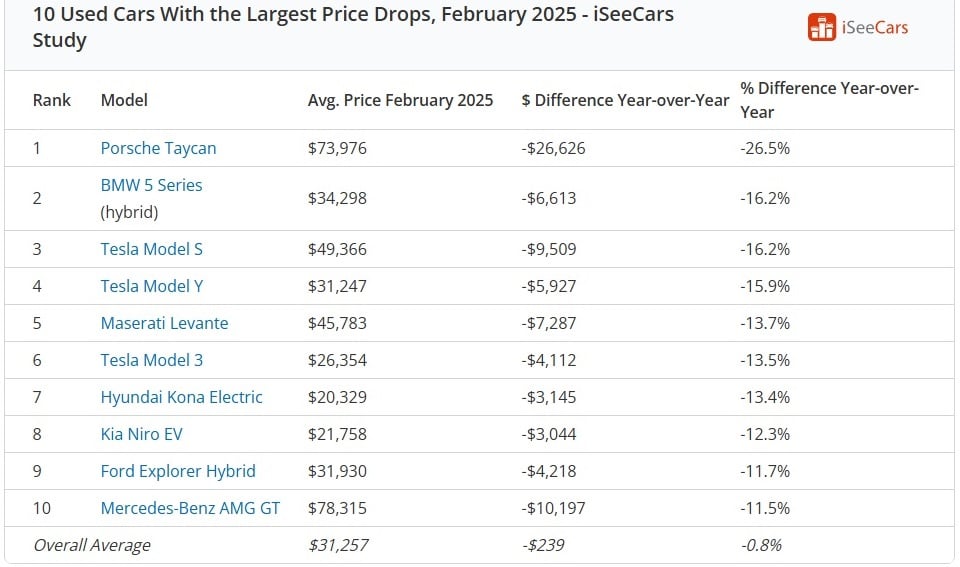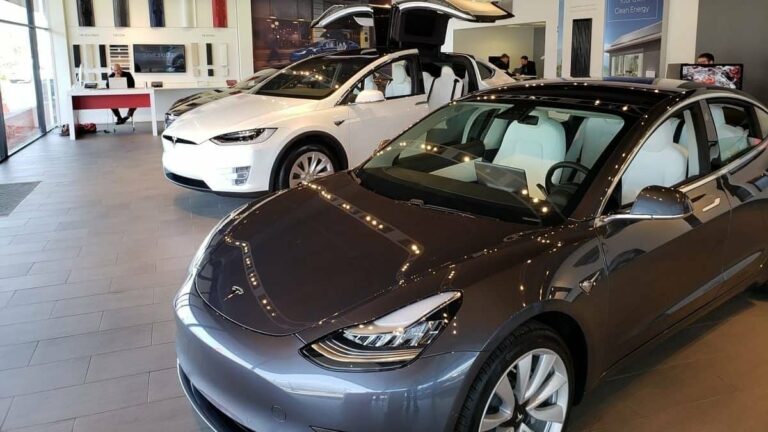EV Depreciation Crisis: Why Your Electric Car Might Be Losing Value Faster Than You Think
The appeal of battery-electric vehicles (BEVs) often includes lower running costs and a reduced carbon footprint. However, a significant drawback can spoil the deal: rapid depreciation. Compared to other vehicle types, the value of electric vehicles tends to plummet. Here’s a breakdown of the reasons why, and how to navigate the EV market to avoid financial losses.
Before diving in, it’s worth considering the best approach for potential EV drivers: leasing. While EVs offer great driving experiences and environmental benefits, their depreciation rates make ownership potentially less attractive. This article aims to shed light on the depreciation issue, its long-standing presence, and its impact on various brands, especially Tesla.
Electric Vehicles Have Long Faced Accelerated Depreciation
The trend of poor value retention in the EV market isn’t new. It’s been a concern for over a decade. Early Tesla Model S owners worried about their car’s resale value. Elon Musk even guaranteed the resale value would match that of a Mercedes-Benz S-Class, a guarantee that is no longer in place.
Poor depreciation isn’t new. Back in 2014, a Torque News article highlighted the Nissan Leaf’s 42% worse depreciation than the Toyota Prius. Further reporting from Torque News in 2019 showed that several new EVs, including models such as the Ford Fusion Energi, BMW i3, and Chevy Volt, made it onto lists of the “10 Worst Cars For Depreciation.”
What EV Owners Are Saying About Resale Value
Here’s what EV owners are saying in online forums:
- M.A., Tesla Model 3: “115K on my 2018 Model 3…love the car, but the resale value (insert profanity here)!”
- B.H., Model 3: “Don’t be surprised to see low to sub $20k offers. Used Model 3 values are way down.”
- C.W., Tesla Model Y: “Currently in a Model 3 and looking to move into a Model Y. The depreciation on the Model 3 has been atrocious, as with many EVs. I absolutely love the car, but the rapid depreciation has far outweighed any type of EV-related savings.”
- E.N., Model Y: “Does this make anyone never want to buy a Tesla again…? No, it was not an investment. But I have never experienced car depreciation so hard.”
- B.E.: “Every time I see how cheap these are going for now it makes me sick. My MYP was 74k almost 2 1/2 years ago.”
- J.L., Model Y: “These cars are dirt cheap with no resell value. Why would anyone buy a used one?”
- C.A., Model Y: “I know a guy that (recently) paid in the $70’s for one…literally half the price now.”
- L.R., Volkswagen ID.4: “My ID.4 depreciated 30% in less than a month with only 30k miles on it. I bought it used with 28k miles for $27K and now I could get around $19K for it. $9K wiped off in depreciation. I have an ICE car and it doesn’t depreciate this fast. Crazy how the value goes down at the 30K mile mark.”
- A.M., Volkswagen ID.4: “I purchased my ID.4 one year ago today. I paid $52,700. It’s now valued at $28,600. I’d say the depreciation is a killer.”
- W.W, Hyundai Ioniq 5: “Just got rid of my Ioniq 5…lost so much money….but the infrastructure is just not there.”
- E.W., Ioniq 5: “I’ve owned my ‘23 Limited AWD exactly one year today. My Ioniq 5 is now valued by Carfax at only 55% of what I paid in cash for it: a huge, early depreciation. (edited for brevity)”
- G.G., Ioniq 5: “I had $12,000 down payment on my 2022 Limited AWD, and I’m still upside down. I’d love to trade it for 2025, but I’m not willing to lose thousands in equity in the process. I have NEVER had a vehicle depreciate this much in so little time.”
The Fastest-Depreciating Cars Are Mostly Battery-Electric
Today, many of the vehicles losing value fastest are EVs. Although luxury models also appear on these lists, many EVs are mainstream in price and volume. The Porsche Taycan EV holds the top spot. Others include Tesla’s Model S, Y, and 3, as well as the Hyundai Kona and Kia Niro EV.

Tesla’s Value Plummets the Fastest
According to iSeeCars, Tesla has experienced the largest overall price drops in its vehicles. The company faced two major changes that impacted resale values. First, Hertz found that EVs don’t work well as rental cars. Many first-time renters had bad experiences with Teslas. Simple, reliable vehicles are better for travelers. Second, actions by Tesla’s leader, Elon Musk, are driving customers away from the brand. Some customers even have difficulty trading in their vehicles to Tesla. When the manufacturer does not take its own products in trades, the situation is poor.
Leases Will Flood the Used EV Market
To keep EVs selling, brands offer extreme discounts and incentives. Many EVs are heavily discounted just like other new cars. Hyundai America’s CEO stated that around 80% of EVs are now leased. These leases typically last around three years. The deep discounts and lease promotions began in late 2023, coinciding with a slight increase in EV deliveries. When these leases mature, many vehicles will return to the market, further driving down used EV prices.
Low Lease Prices Devalue Used EVs
Giveaway lease deals on new EVs directly impact the resale value of older ones. For example, if a three-year lease costs a new car lessee $5,000, buying a used EV for $15,000 to $20,000 becomes costly. Used car financing rates are also higher than rates for new vehicles, making monthly payments on older EVs even more expensive.
EVs Are Rapidly Evolving
EVs are changing rapidly, which hurts the value of older EVs. As recently as last year, high-tech EVs like the Hyundai Ioniq 5 needed a cord to use Apple CarPlay and Android Auto. Improvements in battery technology also mean that older EVs don’t perform as well as newer models.
The New Charger Standard
The standards for charging are changing also. The old CCS charging standard is going out, and the NACS standard, supported by former Tesla enthusiasts, is coming in. Today’s EVs using CCS ports are similar to older vehicles with CHAdeMO ports. This also makes older models less appealing.
How to Avoid Crushing Depreciation
To avoid losing money on an EV, consider leasing. Take advantage of automakers offering lease deals to keep EV sales moving. This approach also protects you from battery issues and mechanical failures. Another option is to consider a hybrid-electric vehicle, as they have better value retention compared to EVs.

Conclusion
Buying a used EV often doesn’t make sense, especially when new leases offer better financial terms. Coupled with higher used car financing rates, those considering a used EV deal need to be careful. Tesla faces the worst depreciation, and many of its models appear on the list of fastest-depreciating vehicles. While it’s easy to blame Elon Musk, the truth is that all EVs depreciate significantly. No current industry trends are likely to reverse this fact any time soon.



